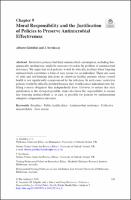Chapter 9 Moral Responsibility and the Justification of Policies to Preserve Antimicrobial Effectiveness
Author(s)
Giubilini, Alberto
Savulescu, J.
Collection
WellcomeLanguage
EnglishAbstract
Restrictive policies that limit antimicrobial consumption, including therapeutically
justified use, might be necessary to tackle the problem of antimicrobial
resistance. We argue that such policies would be ethically justified when forgoing
antimicrobials constitutes a form of easy rescue for an individual. These are cases
of mild and self-limiting infections in otherwise healthy patients whose overall
health is not significantly compromised by the infection. In such cases, restrictive
policies would be ethically justified because they would coerce individuals into fulfilling
a moral obligation they independently have. However, to ensure that such
justification is the strongest possible, states also have the responsibility to ensure
that forgoing antimicrobials is as easy as possible for patients by implementing
adequate compensation measures.
Keywords
Bioethics · Public health ethics · Antimicrobial resistance · Collective responsibility · Easy rescueDOI
10.1007/978-3-030-27874-8_9ISBN
9783030278731, 9783030278748Publisher
Springer NaturePublisher website
https://www.springernature.com/gp/products/booksPublication date and place
2020Grantor
Classification
Bioethics


 Download
Download